Background
It seems a little strange to be putting together a trip report from an activity which took place nearly 5 years ago, but I wanted to write up the experience as a record of the events and so I won't have to keep repeating the story.
At first I expected bits and pieces of the day to slowly come back to me but that has not been the case. The events of that day remain a void in my mind, as if it never happened. My last clear memory before the avalanche is getting my car inspection/emissions test on Friday 2/2/07. I have no memory of planning to go on the hike or preparing for it; nothing. Brian later told me that it'd been my idea to attempt the hike. My first semi-lucid memory occured in the hospital about 2 weeks after the avalanche as I was preparing to go for a physical therapy walk around the block.
rBrian Ascending out of Red Pine
I don’t have a complete medical record of my injuries, just a mental list of the injuries I was told had occurred: several broken ribs, a couple of cracked vertebrae, a collapsed lung, a severe gash on my head, my pelvis was broken in 2 locations, and traumatic brain injury. I did not suffer broken legs as was reported in the media, nor were we ‘skiers’. I also had an assortment of minor cuts and scrapes on my arms, although for the most part I don’t remember these. When I write these items down it doesn’t seem like that big of a deal, but it was enough to keep me in the hospital for 30 days - quite a stretch for someone who prior to this had never spent a day in the hospital (except for birth).
My hiking partner on that day was Brian Dutton; if it weren't for Brian I would be dead. My final position after the avalanche was face down and unconscious on the snow. I would have quickly suffocated had Brian not been there to turn me over. He was also able to keep me warm and alive for the ±5 hours it took for rescue teams to reach us, having been notified via Brian's cell phone call. Brian fared far better in the avalanche yet still suffered a significant battering which included two broken ribs, four broken vertebrae, and a gash on the head requiring 11 staples to close. He managed to end his hospital stay after just a few days, but was out of work for 9 weeks.
![Our First Glimpse of the Pfeifferhorn]() The Pfeifferhorn
The Pfeifferhorn
I don't mean to trivialize his injuries since he could easily have suffered far worse, but just to point out that he came out of the event much better off than I did. Lucky for me, since as I've already said, if it weren't for Brian I would be dead. Brian's thoughts on the accident appear at the bottom of this report.
Brian and I had previously done a number of other climbs together, among them, Liberty Ridge on Mount Rainier, Gannett Peak, and 2 ascents of the Grand Teton. Brian is by far the better climber and also managed to remain composed after the avalanche. I've wondered many times how things might have turned out if the roles had been reversed, with Brian being the more seriously injured climber. I'm glad that didn't turn out to be the case, as I doubt I would have handled things as well. Brian is a former Green Beret in the US Army, and undoubtably his training was a key to my survival. Many thanks to Brian - I owe you my life.
![Final Image]() Final Photo Before the Avalanche
Final Photo Before the AvalancheThe Accident
Since I have no memory of the event I can't provide much detail on our plans. I know we'd set off from the Red Pine trailhead with the plan of doing the Beatout, a long and grueling but popular route typically attempted in late Spring. We reached the top of the Red Pine headwall at ±10:30 am, where we were treated to our first view of peak #1 on the route, the Pfeifferhorn. I know the time from the photo I took when we reached the spot. A week prior I'd gone up with Matt to take a halfhearted shot at the Beatout, but upon reaching the summit of the Pfeifferhorn and beginning the descent down the west ridge, we decided conditions were poor and we were moving too slowly, so we aborted at that point. Several months later Matt jokingly thanked me for not inviting him on this re-attempt.
Skies were clear on the day of the avalanche but ±80 mph wind wind gusts made for less than ideal conditions. We carried snowshoes but were not wearing them when we reached the Redpine headwall. The only reason I know about the snowshoes is that I remember removing their twisted remains from my pack a couple of months later. Obviously I don't recall having any avalanche concerns, but Brian remembered thinking we should have moved over slightly to the right towards the exposed rock spine of the summit ridge as we approached the summit. From a photo it appears that we were approximately 200-300 feet from the summit when we were hit by the 4-6 inch wind slab which carried us over the cliff bands just to the south of the peak. I've made several return trips to the peak, and each time I look down those cliff bands I wonder how we managed to survive.
![After the fall.]() Brian After the Avalanche
Brian After the Avalanche
We came to rest on the snow slopes south of the Pfeifferhorn, Brian several hundred feet below me. Despite his injuries he managed to climb back up to me and turn me face up, then made his phone call to rescue personnel. Fortunately his phone was still working and he was able to get a signal; with my T-Mobile service I probably wouldn't have had a signal from that location. Brian obtained a CD copy of the phone call and ensuing minutes, which he gave to me. I've listened to it half a dozen times, a morbid fascination that my wife Shelley does not share. Brian mentioned being a bit relieved when I slipped back into unconsciousness after a brief period of arousal when apparently I became adamant about hiking the hell out of there.
![looking up toward Joe]() Brian's Perspective of the Avalanche Debris
Brian's Perspective of the Avalanche Debris
Due to our somewhat remote location and challenging weather conditions (i.e., wind), it took rescue personnel approximately 5 hours to reach us. I don't recall any of the rescue, and Brian recalled a hair-raising sled ride down to an awaiting rescue helicopter.
The Hospital
I remember very little of the following weeks in the hospital. At first it was just small fragments of memory (mostly dreams), and finally a somewhat clear memory of preparing to go for a walk around the hospital. Very belated apologies to the nurse's aid who I went absolutely ballistic on when he woke me in the night to give me a shot; for some reason I felt he was attempting to kill me. I suppose it was the numerous drugs I was being given that induced this behavior. I remember a very detached curiosity as to why I was there, although I didn't really know where "there" was. I was frequently asked if I knew where I was and I always answered "The LDS Business College". Close; it was actually the LDS Hospital. I just couldn't seem to grasp this fine difference.
![Recovering]() Hospital Stay
Hospital Stay
I remember a steady stream of visits from family, friends, co-workers, and daily visits from Brian. I slowly transitioned from a wheel chair to a walker, and eventually to my own 2 feet.
![Morphine makes it all better.]() Brian in the Hospital
Brian in the Hospital
The bulk of my physical therapy while in the hospital involved mind exercises and solving puzzle-type problems. Shelley later expressed her frustration at watching this engineer struggle to solve the simplest of problems. But I remember feeling vague twinges of pride when it came time to do physical type exercises; my brain may have been battered but I still had an excellent level of physical fitness.
![Final Day]() Final Day in the Hospital
Final Day in the Hospital
While in the hospital I was visited by numerous friends and summitpost members. Among them were Brian, Dmitry, Grizz, Jay, Jim, John, Ken, Matt, Michael, Mick, Robert, Sharon, Young, and, of course Shelley. Most of them I remember but a few I don't; I was told about them long after they'd visited. At my parents suggestion a visit from Trout, one of our family cats, was approved. Shelley put the kibosh on this plan, more for Trout's sake than anything. I don't remember hating my hospital stay and family members seemed much more pleased than I was when it finally came time to go home on 3/5, although Shelley recalled my daily questions asking if I could go home.
Recovery
Back home I slowly began my recovery. I was still wearing a flak-jacket style vest due to rib and back injuries, but managed to get out for a couple of short hikes before finally climbing Granduer Peak on 3/18, my first summit after the accident. The next day Brian and I met some of the rescue team who were having a year-end party at Snowbird Ski Resort (for some reason I have no memory of this party). I continued with occasional short hikes throughout the Spring. Nothing major, just enough to maintain an acceptable level of fitness. An avid reader, I was reading The Far Pavilions at the time of the accident. I never would have guessed I wouldn't finish the book until the end of December. On 8/11 I made a return trip to the Pfeifferhorn, summiting with Shelley and Grizz. A hike which I'd been able to complete in under 4 hours now took me 8-½. On a hike the following year Grizz wrote a trip report with the accident as a theme.
A few days after I came home Brian returned my backpack to me, which had been given to him by rescue personnel. As I mentioned before my snowshoes were a mangled mess. One of my trekking poles was bent but still functional. My GPS screen was smashed, but amazingly my camera still worked (kudos to Canon cameras). My avalanche beacon was in the pack, the strap having been cut to remove it from my torso. All of the clothes I'd been wearing were in the pack, although they'd been cut off my body. Several months later a friend of Brian's went up and managed to find my ice axe in the boulder field below the summit.
![Back Home]() Happy To Be Home
Happy To Be Home
Our accident received a short write-up in the 2008 edition of Accidents in North American Mountaineering. The one line title of our story was "Avalanche, Poor Position". No doubt.
I returned to work for the first time on 5/17. One of the major benefits of working for the Federal Government is a generous accrual of sick leave. But I'd seen my sick leave balance plummet from 815 hours to 208 hours, and I was beginning to feel a little more normal, so it was time to return to work. Starting with two 6-hour days per week, I quickly built back up to full time, although follow-up doctor appointments and physical therapy continued for some time. A week prior to returning to work I made a quick trip to Yellowstone, my first of 4 visits that year. Although I was still somewhat lethargic from the accident, I remember sitting on the shore of Ice Lake watching the sunset, feeling very lucky to still be alive.
Lingering results of the accident were relatively minor. The most noticeable effect to me was double vision, which steadily became worse throughout the day, particularly when I'd been outside hiking. A couple of years after the avalanche I did a very long day hike in the Uinta Mountains, then drove home the entire way with one eye shut to eliminate the double vision. The double vision was finally corrected a number of years later with a minor surgical procedure. Another noticeable effect is that I no longer seemed to be able to move as quickly as I used to. I'd never been an ultra-athlete and I know there are always faster people in the mountains, but I do keep track of my hikinge times, and I was never as fast I'd been prior to the accident. Since the accident I've done an 80-mile backpack through Yellowstone, day-hiked Gannett Peak, hiked rim-rim-rim on the Grand Canyon, and done a number of other somewhat gnarly hikes, so I don't think fitness is a factor, but I'll probably never be able to move as quickly as I used to. I occasionally felt the need for a mid-day nap, something I never did prior to the accident. I also seem to have some problems remembering names and events. It's probably due to my background as an engineer, but I'm quite good with numbers. Tell me your phone number and I'll remember it for life. But tell me your name and 5 minutes later I may not remember it.
![Another Ascent]() Ascending the Pfeifferhorn
Ascending the Pfeifferhorn
With hindsight the thing that still surprises me the most is my total lack of memory of the accident. I thought it was in there somewhere and would eventually come out, but my memory of that day remains a total blank.
Brian's Thoughts
I remember every bit of the avalanche and of the fall that followed. I remember thinking that we would have been safer in the rocks above us, and how the collapsing slab sounded just like a gun-shot. I remember that my attempts to self-arrest were totally useless. In retrospect it was a good thing that my mountain axe was ripped from my hands; it could have been deadly flinging about beside me as I tumbled over the cliff band and down the slopes below. I remember thinking about my 8 year-old daughter as I fell ' it made me feel sad to know that she was going to have to process my death. I was stunned to be alive when all of the tumbling stopped. Upon opening my eyes I saw that it was a beautiful day. I located my friend, Joe, and called for a rescue as I started to make my way to where he was. Joe was in bad shape - I didn't know if he was going to make it. I did everything that I could think of to keep him both warm and breathing with a clear airway.
It was frustrating trying to explain our location to the sheriff's Department. It was disheartening to watch them fly into and out of the area several times before they located us. I am ever so grateful, however, for the dedication and expertise of all the various rescue efforts that joined forces to bring us out alive. It was comforting to have the company of a party of three nearby, one of whom came down off the ridge to join us and lend a down jacket for the final hour before rescue personnel arrived. We were the subjects of a considerable amount of local media interest; I was even getting calls from Reader's Digest. A week later, however, somebody went into Trolley Square with a gun - we were old news after that. Four months later, a friend went up and retrieved my lost axe; my glove was still in the hand loop. I don't think about it much anymore, but, and this may sound strange, having survived it with no residual injuries, it was a good experience; one in which Joe and I are forever bonded.
Shelley's Thoughts
The news of the avalanche took me down with Joe and Brian. It slugged me behind the knees and knocked me to the floor. No climbers wife wants to get that call of doom. When Brian recounted the events of the day I felt like I was falling with them..twisting and tumbling over every jagged rock.
After the initial shock I felt depression and despair. I too had to learn to relish the baby steps that toddled through the long process of Joe's recovery. At first it was praying for Joe's life. next we focused on healing his bones. Next it was fighting and hoping for more miraculous things regarding his brain injury. I think in some ways it was much harder for me than for Joe. The days were long and the nights were lonely. As soon as Joe was conscious and could speak clearly...which was not all that soon, he wanted to be home, although he does not remember. Traumatic brain injury (TBI) is a strange and frightening injury. I was giving a tome to read which explained the possible side effects of TBI...oh so depressing. I made up my mind to push the unpleasant possibilities aside and dwell on the positive. This attitude, combined with Joe's hard work and a lot of luck, paid off in the long run.
I never blamed climbing/hiking for nearly taking Joe's life. If anything, I credit the sport for giving him a goal to work toward. Many months after the accident Joe was super tired. He basicly slept, worked, and ate. We hiked on occasion but the pace was comfortable for turtles. It was a strange phenomenon when exactly one year after the avalanche Joe just got up one morning and started hiking again. He resumed his habit of climbing Olympus every Friday and some other mountain on Saturday and or Sunday. He has mellowed in his pace and attitude but not in his love of the climb.
I would like to thank Brian for saving my husband that cold windy day on the Pfeifferhorn. I often wonder if Joe would be alive had he been hiking with someone else that day but I won't dwell on that. I think we are just lucky that Brian had the skill and to save a life and the courage to use it. Not surprisingly, a toast to Brian is now a tradition at our Thanksgiving table.
Experiencing something threatening and life altering had it's lessons. I learn to cherish each day. I learned unconditional love. I learned humility. I learned that we have a lot of friends and that we need them. Nothing breaks ups the monotony of a hospital stay like a visit from a pal or two. I also learned to respect the mountains. They have powers that can kill but they can also heal.


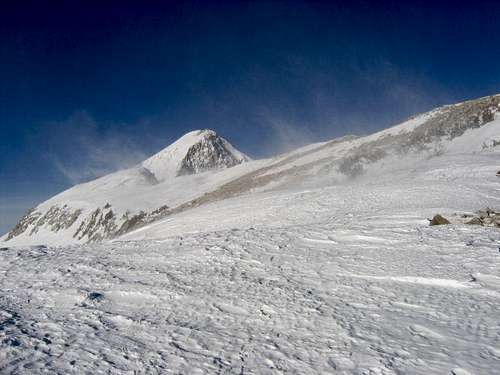
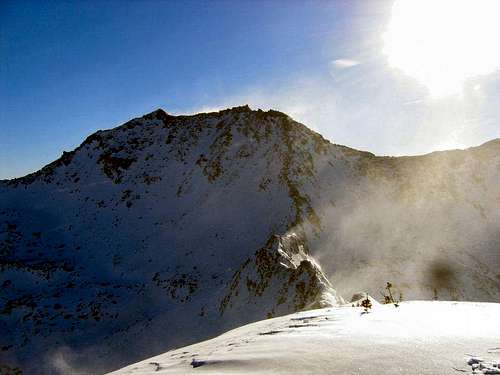
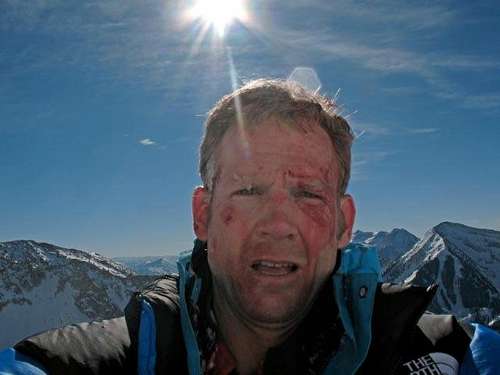
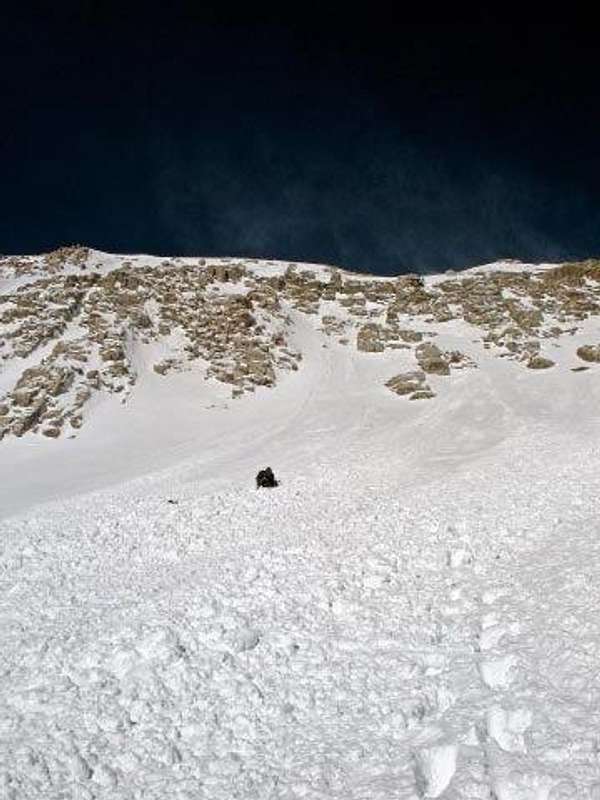
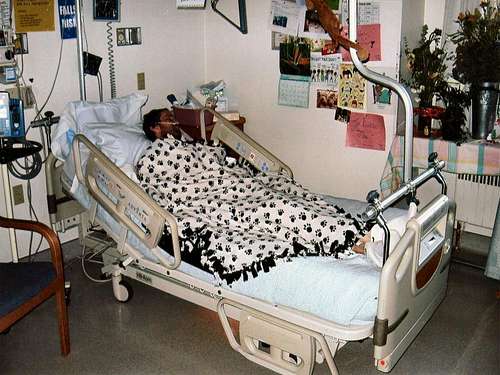
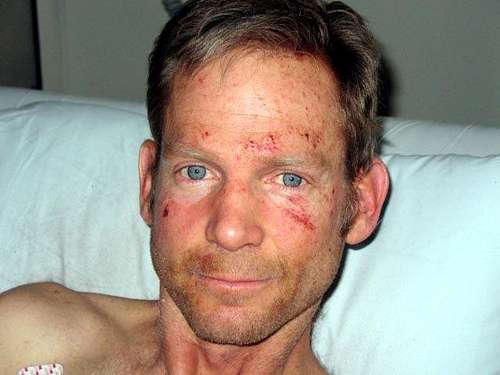
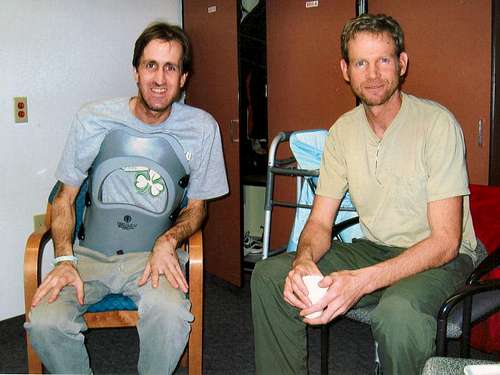
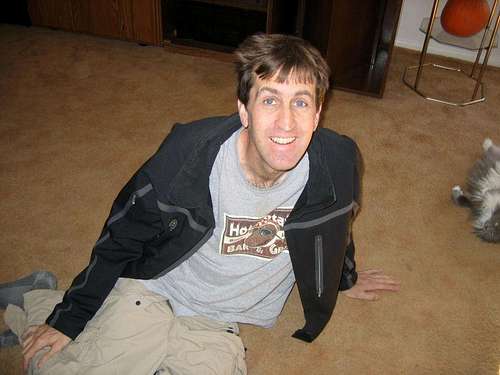
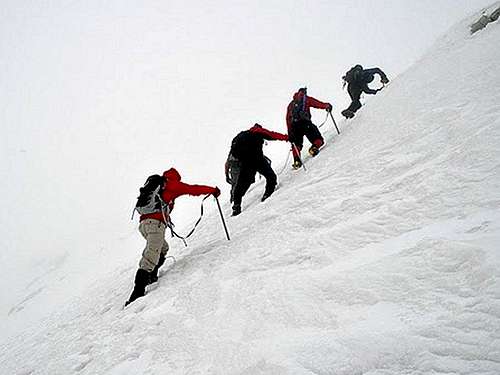








Comments
Post a Comment